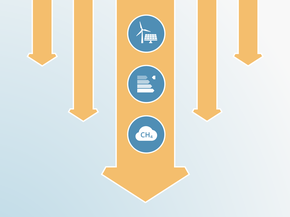Country summary
Overview
Egypt, host of this year’s COP27 UN climate conference, is scaling up its domestic natural gas production and use, risking locking itself in to a high-carbon pathway. It has ditched its plans to build up coal-fired electricity and is pursuing renewable energy investments, but at a much smaller scale than gas.
The CAT rates Egypt’s climate action as “Highly insufficient”. Egypt does not have a quantifiable emissions reduction target, nor has it updated its Paris Agreement Nationally Determined Contribution (NDC) since 2015. Submitting a new NDC with an emissions reduction target well in advance of COP27 would be an important signal for other countries to follow suit, as all are invited to submit more ambitious targets ahead of COP27.
The CAT rates Egypt’s climate action as “Highly insufficient”. The “Highly insufficient” rating indicates that Egypt’s climate policies and commitments are not consistent with the Paris Agreement’s 1.5°C temperature limit. As Egypt does not have a quantifiable emissions reduction target, nor has it updated its NDC since 2015, we have used its “Insufficient” policies and action rating as a basis for rating its mitigation target under the Paris Agreement, but have downgraded it to “Highly insufficient”.
Egypt has taken its first steps toward investing in large-scale renewable energy projects, but these remain much smaller in scale than investments into fossil fuel-based energy sources, in particular natural gas. Egypt is Africa’s second largest natural gas producer and it is making significant investments into new oil and gas production and exploration.
The CAT rates Egypt’s policies and action as “Insufficient”. The “Insufficient” rating indicates that Egypt’s climate policies and action in 2030 need substantial improvements to be consistent with the Paris Agreement’s 1.5°C temperature limit. If all countries were to follow Egypt’s approach, warming would reach over 2°C and up to 3°C.
In its NDC, Egypt describes areas of mitigation, but without a clear commitment to implementing a specific action or targeting any overall or sector-specific emissions level. It is not clear from the text whether these areas are being tackled already, or whether the document simply outlines relevant areas of work. Egypt has not updated its NDC since its initial INDC submission in 2015.
The CAT rates Egypt’s NDC on the basis of its policies and action emissions pathway, rated as “Insufficient”. However, we have downgraded this rating to “Highly Insufficient” because the NDC does not have a quantifiable emissions reduction target and, having been released first in 2015, is outdated. Having a clear mitigation target is essential, because:
a) It provides a clear direction for policymakers and other stakeholders in the country
b) It is a signal to the international community that the government is willing and committed to climate change mitigation. Many developing countries have set targets, while recognising the need for developed countries to lead mitigation of climate change and support others.
To receive a 1.5°C Paris Agreement compatible rating for an “internationally supported target”, Egypt would need to commit to reducing its emissions by approximately 25% by 2030 compared to today’s level—with international support (as part of a conditional NDC target).
Egypt would need to roughly stabilise emissions at today’s levels to meet its fair share of the global mitigation effort to keep temperature rise below 1.5°C.
Further analysis
Latest publications
Stay informed
Subscribe to our newsletter




